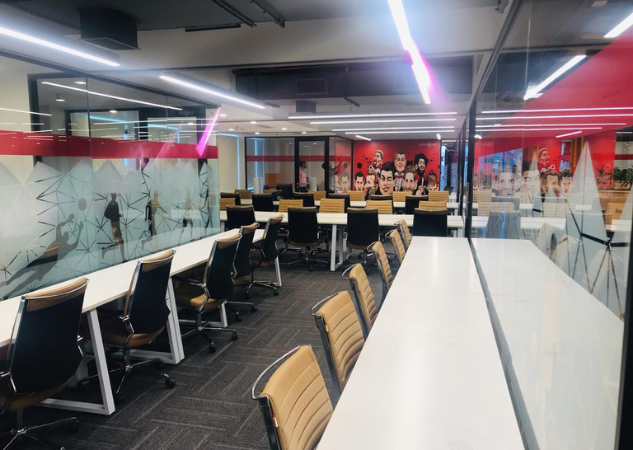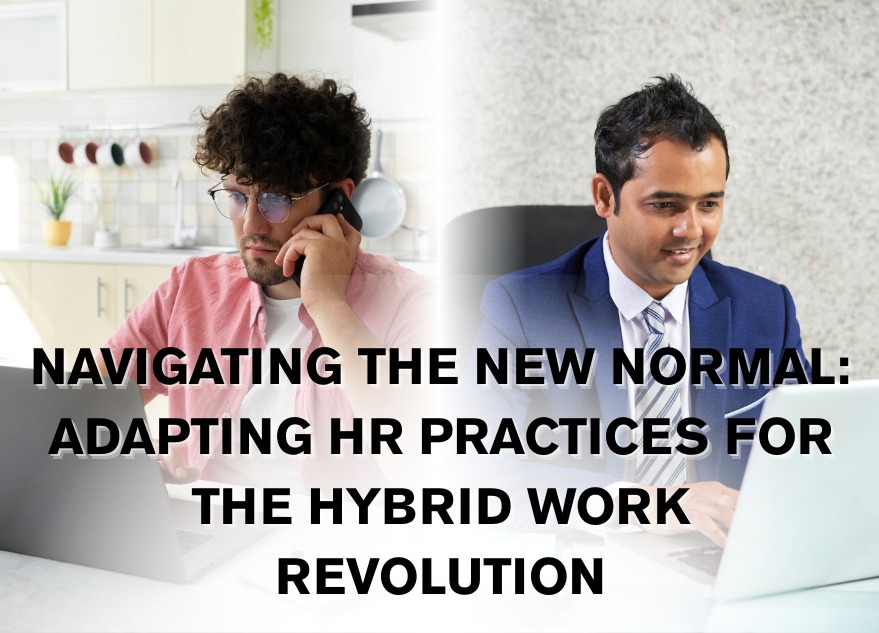The hybrid work model has emerged as a dominant force in the post-pandemic workplace, blending remote and in-office work. As organizations navigate this new normal, HR practices must evolve to meet the changing needs of a diverse and distributed workforce. This post aims to talk about 10 essential points worth considering when adapting HR practices for the hybrid work revolution.
💡 Are you looking for Coworking space in Gurgaon, Noida or Delhi? We are just a call away.
Call Now: 08999 828282
10 Important HR Practices for the Hybrid Work Revolution
- Flexible Work Policies
- Technology and Infrastructure
- Employee Well-Being
- Communication and Collaboration
- Performance Management
- Training and Development
- Inclusive Culture
- Workplace Safety
- Compliance and Legal Considerations
- Leadership and Change Management

1. Flexible Work Policies
Establish clear and flexible work policies that accommodate both remote and in-office employees. Define expectations around work hours, availability, and communication channels to ensure a balanced approach that meets business needs and employee preferences.
2. Technology and Infrastructure
Invest in robust technology and infrastructure to support seamless collaboration between remote and on-site teams. Provide employees with the necessary tools, such as high-speed internet, laptops, and secure access to company systems, to ensure productivity and security.
3. Employee Well-Being
Prioritize employee well-being by offering mental health resources, wellness programs, and regular check-ins. The hybrid model can blur work-life boundaries, so it’s crucial to support employees in managing stress and maintaining a healthy work-life balance.
Also Read: How to Choose an HR Software System in 2024: A Complete Guide
4. Communication and Collaboration
Foster effective communication and collaboration through the use of digital platforms like Slack, Microsoft Teams, and Zoom. Encourage regular virtual meetings, team-building activities, and open channels for feedback to keep everyone connected and engaged.
5. Performance Management
Adapt performance management systems to reflect the hybrid work environment. Focus on results and outcomes rather than hours worked. Implement regular performance reviews, goal-setting sessions, and continuous feedback mechanisms to ensure employees stay aligned with company objectives.
6. Training and Development
Offer training and development opportunities that cater to both remote and in-office employees. Leverage e-learning platforms, virtual workshops, and mentorship programs to help employees upskill and grow in their careers, regardless of their location.
7. Inclusive Culture
Try to cultivate an inclusive culture that values diversity and ensures all employees feel a sense of belonging. Promote equitable access to opportunities, recognition, and career advancement for both remote and on-site staff. Celebrate diverse perspectives and contributions to foster a cohesive team environment.
8. Workplace Safety
Ensure a safe workplace for those who choose or need to work on-site. Implement health and safety protocols, such as regular sanitation, social distancing measures, and health screenings, to protect employees’ well-being.
💡 SMBs looking for HR, Marketing, Technology and Funding solutions for their business.
Call Hello Jarvis 994 8000 800
9. Compliance and Legal Considerations
Stay informed about compliance and legal considerations related to hybrid work arrangements. This includes understanding labor laws, tax implications, and data privacy regulations in different jurisdictions to mitigate risks and ensure legal compliance.
10. Leadership and Change Management
Equip leaders with the skills needed to manage hybrid teams effectively. Provide training on remote leadership, change management, and fostering a positive work culture. Encourage leaders to be empathetic, adaptable, and proactive in addressing the challenges and opportunities of the hybrid work model.
By embracing these strategies, organizations can navigate the new normal and create a hybrid work environment that drives productivity, enhances employee satisfaction, and positions the company for long-term success. Set up the office at The Office Pass (TOP) co-working spaces available in Delhi and NCR. TOP offers all the modern-day facilities to run small to medium-sized businesses facilitating positive HR practices. Contact us for more details at 08999 828282.
FREQUENTLY ASKED QUESTIONS (FAQS):
Question: What is the hybrid work model?
Answer: The hybrid work model combines remote and on-site work, allowing employees to split their time between working from home and the office. This model provides flexibility while maintaining a level of in-person collaboration.
Question: How can HR ensure fair performance evaluations in a hybrid work environment?
Answer: HR can ensure fair performance evaluations by focusing on outcomes and results rather than time spent working. Implementing regular check-ins, clear performance metrics, and feedback mechanisms can help maintain consistency and fairness.
Question: What strategies can HR use to maintain employee engagement in a hybrid setting?
Answer: HR can maintain employee engagement by fostering strong communication channels, organizing virtual team-building activities, providing opportunities for professional development, and ensuring that remote employees feel included in company culture and decision-making processes.
Question: How can HR ensure compliance with labor laws in a hybrid work model?
Answer: HR can ensure compliance by staying informed about local labor laws and regulations, implementing clear policies for remote work, tracking work hours accurately, ensuring fair compensation, and maintaining proper documentation of all employee agreements and work arrangements.
Question: How can companies address the challenge of remote work burnout?
Answer: Companies can address remote work burnout by promoting work-life balance through flexible schedules, encouraging employees to take regular breaks, providing mental health resources, and ensuring that workloads are manageable.
Question: What are the key considerations for onboarding new employees in a hybrid work model?
Answer: Key considerations for onboarding include providing a structured and comprehensive orientation program, utilizing virtual tools for training and communication, assigning mentors or buddies, and ensuring new hires feel connected to the team and company culture.
Question: How can HR handle conflicts that arise between remote and on-site employees?
Answer: HR can handle conflicts by fostering an inclusive culture, promoting open communication, ensuring transparency in policies, and offering mediation and conflict resolution resources. It’s important to address any perceptions of favoritism or inequality proactively.
Question: What role does technology play in supporting hybrid work environments?
Answer: Technology plays a crucial role by providing tools for communication (e.g., video conferencing, instant messaging), collaboration (e.g., project management software, shared document platforms), and productivity (e.g., time-tracking, task management apps). It also supports virtual training and development programs.
Question: What measures can be taken to ensure cybersecurity in a hybrid work environment?
Answer: Measures to ensure cybersecurity include providing employees with secure devices, using VPNs, implementing multi-factor authentication, conducting regular cybersecurity training, and ensuring that remote work policies include guidelines for data protection and secure access to company systems.
Question: How can companies foster a sense of community and belonging among hybrid teams?
Answer: Companies can foster community by organizing regular virtual and in-person meetings, creating opportunities for social interactions, celebrating achievements and milestones, promoting inclusive practices, and encouraging collaboration across different work settings. Regular communication and team-building activities are key to maintaining strong relationships and a cohesive company culture.



